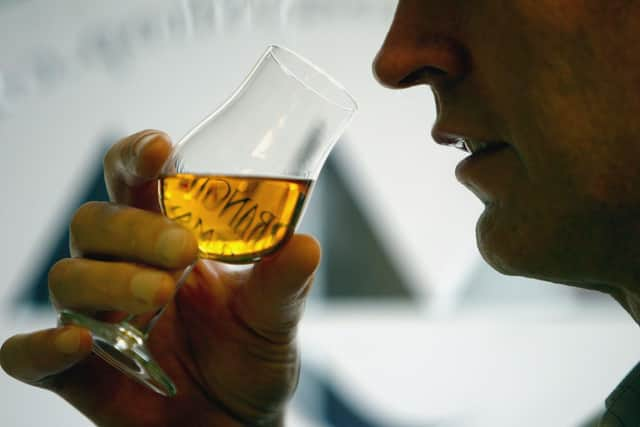SNP's nanny-state attitude to alcohol poses threat to £5.5 billion Scotch whisky industry – John McLellan
Across from me, a dad was taking his son of maybe around ten to the football and they were joined by a man in his mid-20s. Wearing earphones, I didn’t earwig their conversation but as we approached Queen Street I took them off to get ready to alight and couldn’t help but overhear the advice the younger man gave the little boy.
“Aye, wee man, it’ll no be long before you’re on the f***in’ Buckie before the fitba,” he said, winking at the somewhat uncomfortable-looking parent who put discretion before valour and returned a weak smile. And as they got off, left on the table was the ubiquitous green half bottle with the familiar yellow label. Le Buckfast Nouveau had arrived and been drunk.
Advertisement
Hide AdAdvertisement
Hide AdThe association between “Radge Rioja” and the Benedictine monks of Buckfast Abbey is well known in Scotland and Northern Ireland, the unique combination of 15 per cent alcohol and caffeine making it a favourite pre-match tipple. You can get blootered but stay wide awake, so for the discerning observers of the Beautiful Game, what’s not to like? Everyone has heard of it, its place in popular lore cemented by Rab C Nesbitt and Jamesie Cotter paying the Devon Abbey a visit and then Edinburgh Lord Provost Eric Milligan being offered a swig when celebrating Hearts’ Scottish Cup final victory in 1998.


But when have you ever seen a Buckfast advert? Its popularity is down to reputation, not clever marketing or seductive design. Buckfast and Scotland’s difficult relationship with alcohol are inextricably linked, and after the SNP introduced minimum pricing of alcohol to tackle the problem, one of the success stories was Buckfast. At around £8 a bottle, it was unaffected but Scottish sales reportedly soared by 40 per cent in the first year as drouthy drinkers on a budget abandoned cheap cider. Meanwhile, record deaths from all addictions remain virtually unchanged. Like Buckfast, street drugs don’t come with an ad campaign, but price incentives work wonders.
Yet, the Scottish Government appears convinced brand awareness campaigns contribute to Scotland’s undeniable problems with excess alcohol consumption, and cracking down on booze marketing is the next step in breaking the relationship, after what looks very like the predictable failure of minimum pricing.
“By restricting alcohol marketing in Scotland we hope to reduce the appeal of alcohol to our young people. This will support a reduction in consumption of alcohol and subsequently improve their health and health prospects as adults,” writes public health minister Maree Todd in her introduction to a consultation which lasts till March 9. And she added: “It will also reduce the potential triggering effect that alcohol marketing can have on heavy drinkers and those in recovery or treatment.”
No one would argue against tackling activities which are demonstrably harmful, but the consultation seems to start by assuming all alcohol marketing is inherently dangerous, and invites evidence to the contrary. But the paper also suggests counter-arguments come from vested interests, like the industry-funded Portman Group or the Advertising Standards Authority, so the bar, as it were, is set very high if Ms Todd is to be persuaded otherwise.
“Although there is limited research on the impact alcohol marketing has on adults in the general population, it is likely that alcohol marketing also makes alcohol more attractive to adults generally and influences consumption,” the 63-page paper asserts, and then produces the solution. “The consultation largely proposes potential introduction of tighter controls on the volume of alcohol marketing permitted rather than new rules relating to the content,” it says.
Just like Gender Recognition Reform, the effect on a minority trumps wider impacts, but with serious implications for an economic value chain which extends into creative industries, commercial businesses and the support network for sports and cultural organisations. Alcohol marketing is unacceptable, the paper implies, because alcoholics feel excluded every time they see brand advertising, so newspapers and magazines are drawn into a potential ban even if they can show their audiences are primarily adult.
“Alcohol marketing can lead to negative emotions including loss, lack of belonging, anger, sadness, guilt and exclusion from the norm,” it claims. That may be true for some individuals, but is this a justification for undermining thousands of livelihoods? It appears so.
Advertisement
Hide AdAdvertisement
Hide AdIt is getting perilously close to prohibition because the implications are that anything attractive associated with alcohol could easily be off-limits. Diageo spent around £150m converting Frasers into Johnnie Walker Princes Street, to create a cathedral to Scotland’s best-known global product but even portraying whisky as an aspirational, quality product to be savoured, not swallied, falls foul of the principles outlined in the paper.
Attractive bar facades or comfortable interiors like the Scotch Malt Whisky Society’s venues into which drinkers can luxuriate while enjoying their favourite tipples? The Scottish Government’s cross-hairs are on them.
According to the Scotch Whisky Association, the industry provides £5.5 billion in gross value added to the UK economy, and as one of the few industries which can’t up sticks, that’s a potential £5.5bn contribution to the economy of an independent Scotland. The SWA estimates the industry directly employs over 11,000 people in Scotland, supporting 7,000 jobs in the Highlands and Islands. Having set itself against the oil and gas industry, it’s as if the SNP has developed a death wish against the North.
It's easy to be cynical that the big drinks companies only take their responsibilities to responsible consumption seriously because of the threat of statutory action, but the Scottish Government’s approach is the clearest signal that it’s all been a waste of time, and we need the Scottish Government to protect us from ourselves. Pass the Buckie, wee man, I need a drink.
Comments
Want to join the conversation? Please or to comment on this article.
